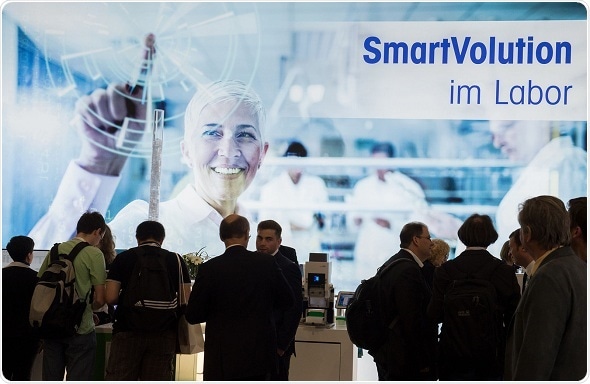Feb 27 2019
What changes is digital integration bringing to modern labs? What's already possible today? What will be possible tomorrow? These questions and more will be addressed at LABVOLUTION, Europe's flagship trade show for innovative lab equipment and laboratory workflow optimization. LABVOLUTION runs in Hannover, Germany, from 21 to 23 May
Laboratories are undergoing major change, and the engine of this change is digitization. Digitization is driving automation, enabling ever more complex workflows and facilitating interaction at all levels. While there is still quite a gulf between the early adopters and the late adopters, there's no denying that digital integration and big data are the way of the future in the lab sector, just as they are everywhere else. As Europe's flagship trade show for innovative lab equipment and laboratory workflow optimization, LABVOLUTION naturally has a strong focus on this trend – as per its 2019 lead theme, "The Integrated Lab".

Bringing connectivity to the lab
In today's digital age, value creation is no longer based purely on new innovations. Increasingly, it is also based on leveraging those innovations through the power of data.
If you want to succeed in, say, the life sciences, you can't afford to just passively monitor your data. You have to actively use it by connecting it up, sharing it and converting it into premium-grade knowledge."
Dr. Siegfried Bialojan, Executive Director, Life Science Center, Mannheim, Ernst & Young GmbH
An outstanding contributor to the discussion around laboratory integration is Germany's smartLAB project, which in 2019 will be staging a special showcase at LABVOLUTION for the third year running. With support from partners from science and industry, the "smartLAB – the intelligent lab of the future" showcase presents a hands-on vision of tomorrow's digitally integrated laboratories. One of the partners in the smartLAB showcase is realworld one. For its contribution to the showcase, realworld one has translated laboratory workflows into virtual space, providing a fully immersive experience in which users can interact with equipment and perform lab set-up.
The display is powered by realworld one's own augmented reality platform, which builds bridges between industry and science by providing new ways of collaboration between manufacturers, users and researchers. "People from all around the world can use our platform to connect and talk with each other in virtual space," explains realworld one's Global Business Development Director, Patrick Pfirrmann. "Products and process equipment are recreated with extreme fidelity, and are interactive and fully functional, so platform users can work with them in a very real sense. This opens up completely new possibilities, such as teaching, safety training, sales and marketing applications, as well as the ability to present use scenarios for new products."
Another company presenting smart, integrated applications for laboratories at LAVOLUTION is Mettler Toledo. One of these applications is an automated solution for transferring measurement and reading data between instruments, thereby avoiding manual transfer errors. The core idea is a workflow in which a sample is weighed and the weight data are then automatically transferred to the next item of analysis equipment, either via RFID or by means of a computer network. "The integrated laboratory, as we conceive of it, encompasses more than just the big items of equipment," explains Market Manager Christoph Jansen. "Even supposedly simple applications can be integrated elegantly into the data flow." He's referring to scales, pH-meters, conductivity meters, melting point measurements, refractometers, density meters, UV/VIS spectrophotometers, titrators and the like. "The digitization platform that makes all of this possible is our software LabX," Jansen explains. "Multiple lab instruments can be connected to it at the same time. From there, it is a simple step to connect them all to a higher-level laboratory data system and hence enable seamless data transfers."
Pharmaceutical and laboratory equipment supplier Sartorius is also investing heavily in tomorrow's integrated laboratories. One of the main focuses of its lab integration work is on enhancing the efficiency of lab workflows through the use of integrated apps and virtual reality. "Laboratory digitization is a challenge, but it is an opportunity, too," says Dr. Reinhard Baumfalk, Head of Product Development, Lab Products and Services Division at Sartorius. "The complexities involved means it's a challenge that no one group can master on its own, neither lab operators nor providers of lab equipment. That is why we are so glad of the opportunity to meet up with users and partners from industry and research at LABVOLUTION to discuss concepts and solutions for tomorrow's laboratories.
Clearly, the "Integrated Lab" lead theme will feature prominently at the smartLAB showcase, just as it will at the displays of numerous other exhibitors and indeed at an all-new group display staged by providers of lab information management systems (LIMS). It will also be a major part of the supporting program. For example, it will be very much to the fore at the Lab USER Dialogue, a series of workshops where providers will present their solutions and potential users will have the opportunity to ask questions and try out the equipment for themselves. As well as this, there will be multiple speaking events and panel discussions dedicated to the opportunities and challenges of tomorrow's connected, integrated laboratories.